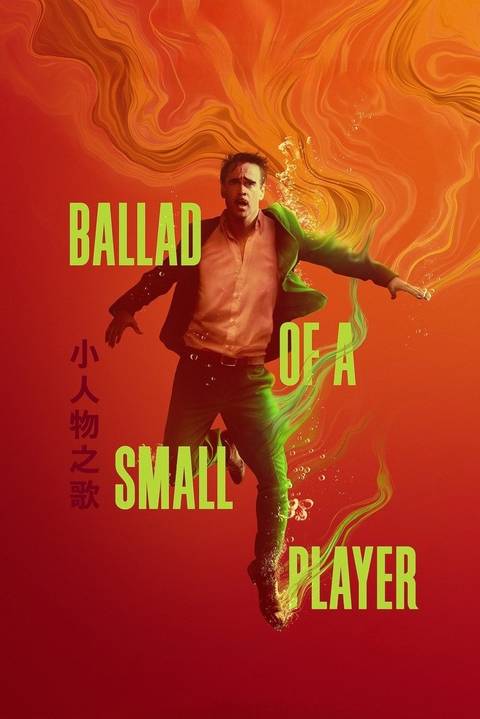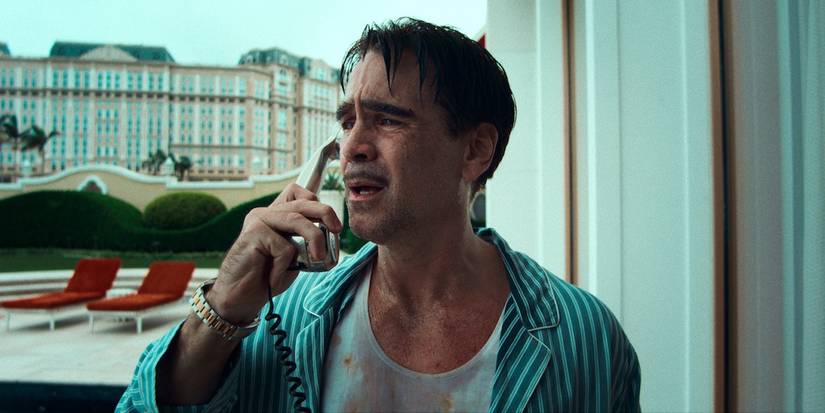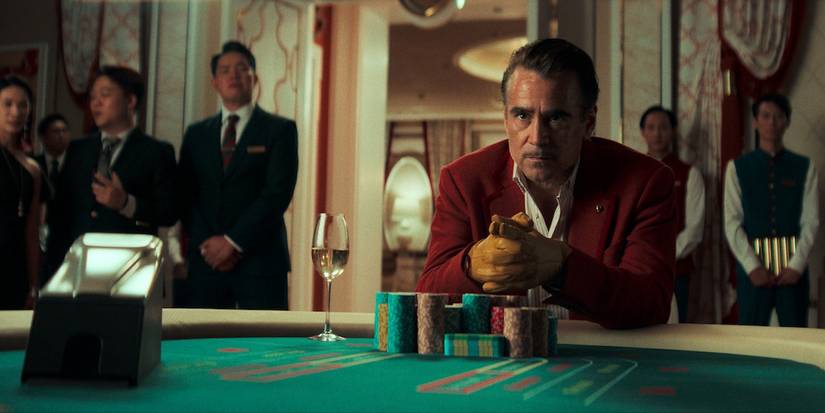Netflix‘s Ballad of a Small Player seemed to have everything going for it. Its director, Edward Berger, had been on a hot streak. His previous films, All Quiet on the Western Front and Conclave, were hits with critics, audiences, and award bodies. Its star, Colin Farrell, is one of those character actors in a leading man’s body, well-respected within the industry and hardly ever turning in anything but a fantastic performance. And it’s adapted from a 2014 novel of the same name by author Lawrence Osborne, which found its way onto many best-of lists. The streamer didn’t appear to be making a risky bet by backing Berger, Farrell, and their take on this surreal psychological thriller about compulsive gambling.
But that bet may not pay off the way its creative team or its backers might’ve expected. The film is currently sitting at 57% on Rotten Tomatoes and is faring poorly with users on Letterboxd. Despite Farrell’s typically committed and captivating turn as the gambler in question, its Oscar hopes have all but vanished. Ballad of a Small Player is, perhaps, an example of the type of story that is best suited to the page, but even in book form, much about it is purposefully ambiguous. If you took a chance on Ballad of a Small Player and have lingering questions about what you saw, we have (some) answers.
Colin Farrell’s Lord Doyle Is an Unreliable Narrator
Ballad of a Small Player is set in the casino-dominated world of Macau, China. The man we believe to be Lord Doyle is enjoying an extended stay at a luxury hotel, but can’t pay his bill. His room is littered with suits and ties as well as empty champagne bottles, and he lives as though drinking, dining, and gambling are his job. Lord Doyle is crass and disheveled but desperate to present himself as posh and composed. It’s clear that the sums of money he wagers are significant to him, but he tries to pretend they’re not. In fact, it’s pretty clear from the beginning that Lord Doyle is pretending.
We get confirmation of this when Tilda Swinton’s Cynthia Blithe shows up and takes a candid photo of him. It turns out Blithe is a private investigator who’s been hired to track him down and recover the money he stole. Lord Doyle isn’t a lord at all; he’s a disgraced lawyer who cons vulnerable elderly clients out of their savings, then flees to gamble the cash away.
That Doyle (whose real name is Riley) isn’t an independently wealthy nobleman but thinks he can pass for one is an in-movie critique of his character more than a twist. His colorful velvet sports coats are tacky, as are the yellow leather gloves he wears, ostensibly for good luck. Champagne is his preferred drink because it’s most obviously associated with classiness, and he acts as though he’s “good” at his game of choice, baccarat, even though there’s no skill to it. But Doyle does seem to understand that he’s an addict, or more accurately, a glutton for punishment. He consumes deeply unhealthy amounts of food and alcohol throughout the film, but his real addiction is living with his back against the wall. He likes to lose.
When we meet him, Doyle already has debts exceeding $100,000, and those are just the ones we know about. He’s given until Tuesday to make good, but as soon as he has any money in his pockets, he compulsively spends it on champagne, lobster, or baccarat. As is often the case in movies about gambling, the plot begins as a mission to repay his debts and escape deadly consequences. Really, like the book, the film is interested in something deeper than one man’s crises.
The Ending of ‘Ballad of a Small Player,’ Explained
Its Ambiguity Is a Statement About Addiction
About halfway through Ballad of a Small Player, Doyle goes to a fancy restaurant where he gorges himself as he tries to figure out his next move. In the novel, the character considers faking a heart attack. In the film, he simply appears to go into cardiac arrest. He’s saved by his implied love interest, Dao Ming, a kind-hearted loan shark who works for one of the casinos he frequents. She pays his tab and smuggles him to a dockside shack where she nurses him back to health.
Importantly, Dao Ming is also the person who introduces Doyle to the mythology of the Hungry Ghost. The events of the novel and the film unfold as local citizens celebrate the Hungry Ghost Festival. She explains that their concept of the afterlife isn’t as simple as heaven and hell, and that souls like his (people with an addiction) are doomed to the realm of the Hungry Ghosts, where they indulge but with no pleasure and are never sated. Doyle also refers to himself as a “gweilo,” which translates to “foreign ghost,” or a non-Chinese gambling tourist who wanders about, otherwise disconnected from society.
After Dao Ming rescues him, she tells him it’s not too late for him to change. She’s weighed down by guilt, having loaned money to men who ended their lives when they couldn’t pay it back. She knows what the future holds for Doyle if he’s not careful. While she’s gone, he finds what is presumably her savings at the end of a sunken rope, and immediately begins gambling again. Ultimately, he bets the entire enormous sum on a single game of baccarat against an acquaintance, another foreign career gambler. Doyle wins and is easily rich enough to settle his accounts. However, cameras capture some specter over his shoulder, and the casino accuses him of cheating. Just moments before, Doyle saw himself as a Hungry Ghost in his bathroom mirror.
The movie ends as Doyle leaves with his fortune, which he burns in a ceremonial fire on the night of the Hungry Ghost celebration. What actually happened and what it all means is left to the viewer’s imagination. The interpretation that most closely matches the book is that Dao Ming may not have been real, but a ghost who tried to warn Doyle about his fate. An argument could be made that Doyle died at the restaurant and is embarking upon his eternity as a Hungry Ghost. Yet another possibility is that a Hungry Ghost “helped” him win at baccarat, which only served to keep his addiction going.
The final shot symbolizes Doyle’s self-destruction, and the use of the Hungry Ghost motif is a statement about the nature of gambling, specifically, and of addiction more generally. However, viewers who stuck around through the credits will have had their palate cleansed by an extra scene in which Farrell and Swinton share a dance. It doesn’t really add clarity to the film’s meaning so much as it calls back to Doyle’s earlier request for Cynthia to cut loose with him. Ballad of a Small Player is streaming on Netflix on October 29.

- Release Date
-
October 15, 2025
- Runtime
-
101 Minutes
- Director
-
Edward Berger
- Producers
-
Matthew James Wilkinson, Elle Gibbons, Mike Goodridge




